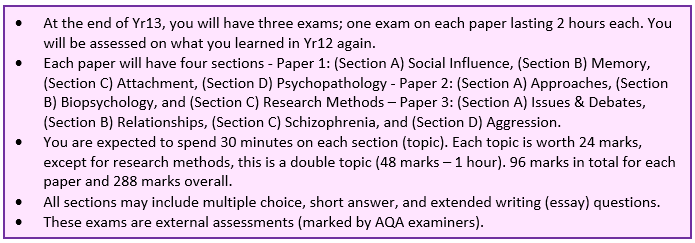Psychology
Psychology is a diverse and intriguing subject, which enhances students’ awareness about themselves and others. Psychology is the scientific study of people; thoughts, feelings and behaviour. The Psychology department aims to equip students with a deeper understanding of how innate qualities as well as experience influence behaviour, enabling pupils to consider different perspectives. Students are encouraged to think critically and to reflect on the application of theoretical concepts to everyday life.
This ever popular and successful subject is taught by highly qualified subject specialists fully committed to the continued success of students; Ms. Waithe and Ms. Chudasama. The Psychology teachers are passionate about their subject and use a variety of methods and enrichment opportunities, including original studies footage, practical research, and yearly trips, to enhance learning and help students feel excited about seeing how Psychology works.
key stage 4 overview
WHY STUDY A PSYCHOLOGY GCSE COURSE:
The psychology GCSE offers students an opportunity to learn about key concepts in modern psychology including mental health problems such as depression and addiction and how the brain affects our behaviour. Other important concepts include how memory works, how our social context impacts our behaviour, and how we perceive our environment in different ways. This engaging subject not only introduces students to the fundamentals of psychology, but also develops critical analysis, independent thinking and research skills.
COURSE AIMS:
Courses based on this specification must encourage students to:
- Use specialist vocabulary, psychological concepts, terminology and convention to engage in the process of psychological enquiry
- Acquire knowledge and understanding of psychology, developing an understanding of self and others, and how psychological understanding can help to explain everyday social phenomena
- Understand how psychological research is conducted, including the role of scientific method and data analysis
- Present information, develop arguments and draw conclusions through a critical approach to psychological evidence, developing as reflective thinkers
- Develop an understanding of the relationship between psychology and personal, moral, social and cultural issues, and develop an understanding of ethical issues in psychology
- Develop an understanding of psychological issues, the contribution of psychology to individual, social and cultural diversity, and how psychology contributes to society.
WHAT WILL I LEARN ON THIS COURSE?
The AQA GCSE course includes:

Cognition and Behaviour is covered in Year 10 and Social Context and Behaviour is covered in Year 11.
ENTRY REQUIREMENTS:
There are no previous learning requirements however, in order to develop skills, knowledge and understanding in psychology, students need to demonstrate competence in areas of Mathematics and Biology and have a good standard of English writing as the exam consists of several extended writing pieces.
HOW WILL I BE ASSESSED?
This qualification is purely exam based and students will take two exams at the end of their final year based on the content they have covered throughout the two year period. GCSE Psychology is assessed by written examinations through structured and extended answer (essay) questions. In order to achieve the award, students must complete all two exams in May/June in a single year. There is no coursework at GCSE Psychology.
FURTHER EDUCATION
Psychology can be taken as A Level in the school where further topics such as Relationships, Aggression and Schizophrenia are studied. However, you don’t have to take the Psychology A-Level because you have done the GCSE; equally you can take the A-Level even if you have not done the GCSE. Although there is great overlap, these are independent courses.
CAREER PROSPECTS
People with a background in Psychology are sought after in numerous careers such as Management, Marketing, Teaching, Research, Social work and Healthcare.
If you are interested in becoming a psychologist, following postgraduate study, you can specialise in Sports, Educational, Clinical, Counselling, Forensic, Occupational or Neuro, Psychology.
YEAR 10
Subject content
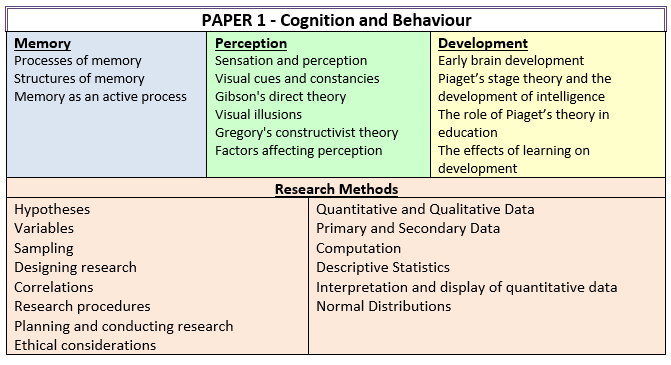
Assessment

YEAR 11
Subject content
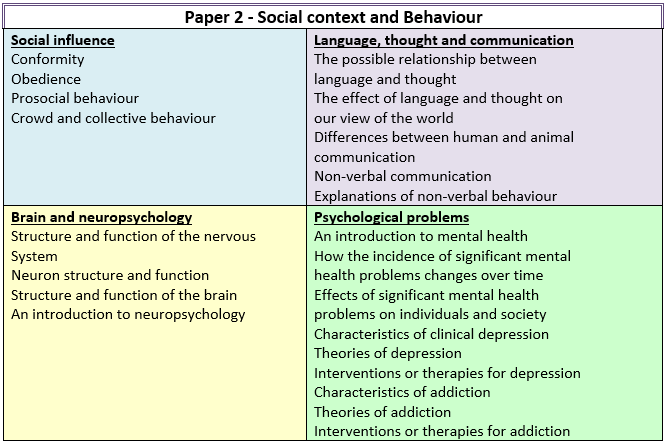
Assessment

key stage 5 overview
WHY STUDY A PSYCHOLOGY A LEVEL COURSE:
Consider the answer to the following questions:
- Would I harm another human being if asked to?
- What can I do to improve my memory for exams?
- Am I the result of my childhood care?
- Am I ‘normal’? How do I know?
- Why do I always get ill around exams time?
- I am ‘in love’ with a celebrity, is that normal?
- Can cannabis use make me ‘schizo’?
- Genocide, domestic violence, and violence in sports... Could it be prevented?
These are some of the questions that the Psychology A-Level course will attempt to answer. However, as a science, psychology is not interested in personal opinions or anecdotal evidence. Psychologists base their theories upon empirical research and it is this evidence that students are encouraged to give careful consideration.
COURSE AIMS:
Courses based on these specifications must encourage students to:
- Develop essential knowledge and understanding of different areas of the subject and how they relate to each other
- Develop and demonstrate a deep appreciation of the skills, knowledge and understanding of scientific methods
- Develop competence and confidence in a variety of practical, mathematical and problem-solving skills
- Develop their interest in and enthusiasm for the subject, including developing an interest in further study and careers associated with the subject
- Understand how society makes decisions about scientific issues and how the sciences contribute to the success of the economy and society.
COMBINES WELL WITH:
Psychology is one of the most popular subject choices at A-level as the course facilitates and combines well with most A-Levels. The course helps develop scientific research, mathematical, essay writing, analytical, and critical thinking, skills so it can complement a wide range of subjects.
FIELDS IT CAN LEAD TO:
People with skills in psychology are sought after in diverse professional fields such as business, management, teaching, research, social work and careers in medicine and healthcare.
PROFESSIONAL SPECIALISMS:
If you are interested in studying Psychology at post-graduate level and becoming a psychologist, you will be able to choose from a broad range of professional specialisms including Sports, Education, Clinical, Counselling, Forensic, Occupational, and Neuro- Psychology.
WHAT WILL I LEARN IN THIS COURSE?
Students follow the AQA A-Level Psychology Specification:
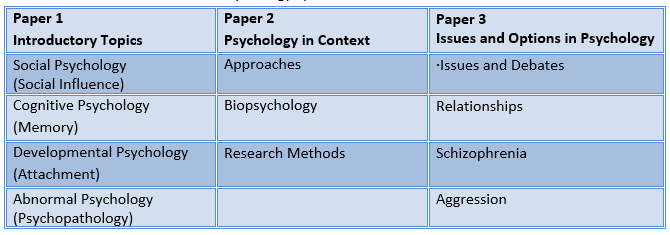
Introductory Topics and 1/2 of Psychology in Context is covered in Year 12
The other 1/2 of Psychology in Context and Issues & Options is covered in Year 13
ENTRY REQUIREMENTS:
To study Psychology at A level, you are required to meet the Sixth Form entry requirements - 5 GCSEs Grade 5 and above (including English, Mathematics, and Science) preferably grade 6 in English Language.
Although it would be advantageous, it is not necessary to have taken the Psychology GCSE in order to take the A level course.
HOW WILL I BE ASSESSED?
A-Level Psychology is assessed by written examinations through structured and extended answer (essay) questions. These are linear qualifications. In order to achieve the award, students must complete all three exams in May/June in a single year. There is no coursework at AS or A2.
YEAR 12
Subject content
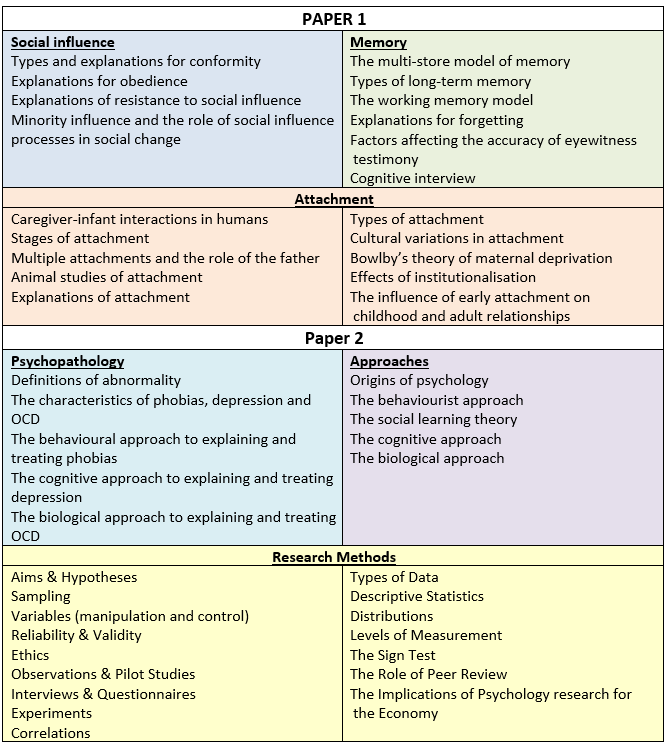
Assessment

YEAR 13
Subject content
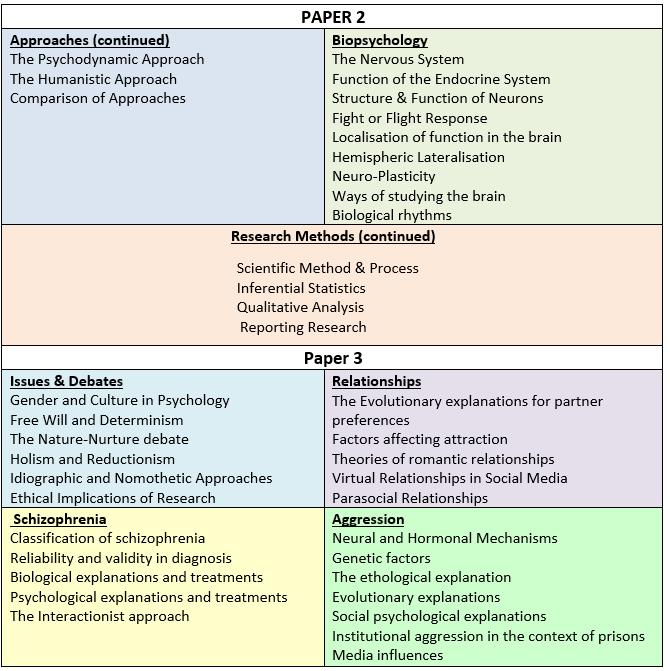
Assessment
